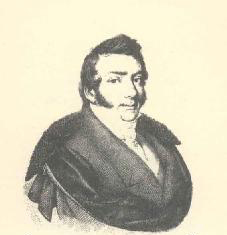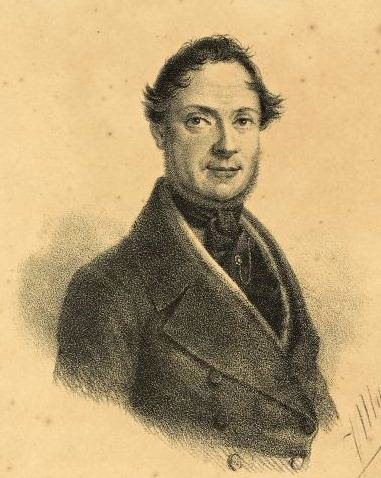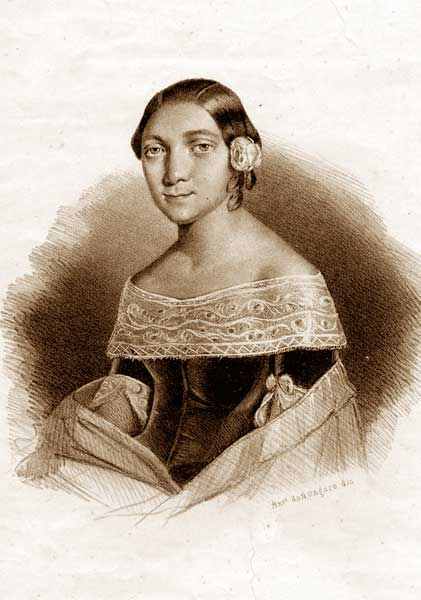|
Vaccai
Nicola Vaccai (15 March 1790 – 5 or 6 August 1848) was an Italian composer, particularly of operas, and a singing teacher. Life and career as a composer Born at Tolentino, he grew up in Pesaro, and studied music there until his parents sent him to Rome to study law. Having no intention of becoming a lawyer, he took voice lessons and eventually studied counterpoint with Giuseppe Jannaconi, an important Roman composer. When Vaccai turned twenty one, he went to Naples and became a disciple of Paisiello, whose ''Barber of Seville'' was considered a comic masterpiece until Rossini's ''Barber'' swept it from the stage 35 years later.J.G. Paton, 'Introduction', in Nicola Vaccai, ''Practical Method of Italian Singing'' ed. J.G. Paton (G. Schirmer, 1975), pp. iii-iv. Vaccai launched his career in Venice, initially earning his living by writing ballets and teaching voice. He had his first operatic success with ''I solitari di Scozia'' in Naples in 1815. In Parma he was commissioned t ... [...More Info...] [...Related Items...] OR: [Wikipedia] [Google] [Baidu] |
Giovanna Gray
''Giovanna Gray'' is a tragic opera () in three acts composed by Nicola Vaccai. The libretto by Carlo Pepoli is based on the last days of the English noblewoman Lady Jane Grey who was executed for treason in 1554. The opera premiered on 23 February 1836 at La Scala, Milan, with Maria Malibran in the title role. It was a failure at its premiere, and the work never entered the repertoire. Malibran's performances in ''Giovanna Gray'' were the last time she appeared on the stage of La Scala. Background ''Giovanna Gray'' marked Vaccai's return to opera composing after a hiatus of almost 8 years. He composed it specifically for Maria Malibran who had often sung Romeo in his earlier opera (and his only major success), ''Giulietta e Romeo''. As a vehicle for one of the reigning prima donnas of the day, the tragic story of Lady Jane Grey was an apt one and had been the inspiration for numerous plays, poems, and paintings. Donizetti had thought of using it when his opera ''Maria Stuarda'' ra ... [...More Info...] [...Related Items...] OR: [Wikipedia] [Google] [Baidu] |
Giulietta E Romeo (Vaccai)
''Giulietta e Romeo'' (''Juliet and Romeo'') is an opera in two acts by the Italian composer Nicola Vaccai. The libretto, by Felice Romani, is based on the tragedy of the same name by Luigi Scevola and, ultimately, on the 1530 novella of the same name by Luigi Da Porto. It was first performed at the Teatro alla Canobbiana, Milan, on 31 October 1825. It was Vaccai's last major success, although he wrote another nine operas,Loewenthal 1978, columns 697–698. and is rarely performed in its full version today. The opera was also first performed in Barcelona on 26 May 1827, Paris on 11 September 1827, Lisbon in the autumn of 1828, London on 10 April 1832, and Mexico in July 1841. It was first performed in Graz (in a German translation by I. C. Kollmann) on 12 October 1833 and Budapest (also in Kollmann's translation) on 31 July 1845. On 27 October 1832, during a performance of Bellini's ''I Capuleti e i Montecchi'' in Bologna, the next to last scene of Vaccai's opera was subst ... [...More Info...] [...Related Items...] OR: [Wikipedia] [Google] [Baidu] |
Vincenzo Bellini
Vincenzo Salvatore Carmelo Francesco Bellini (; 3 November 1801 – 23 September 1835) was a Sicilian opera composer, who was known for his long-flowing melodic lines for which he was named "the Swan of Catania". Many years later, in 1898, Giuseppe Verdi "praised the broad curves of Bellini's melody: 'there are extremely long melodies as no-one else had ever made before'." A large amount of what is known about Bellini's life and his activities comes from surviving letters—except for a short period—which were written over his lifetime to his friend Francesco Florimo, whom he had met as a fellow student in Naples and with whom he maintained a lifelong friendship. Other sources of information come from correspondence saved by other friends and business acquaintances. Bellini was the quintessential composer of the Italian '' bel canto'' era of the early 19th century, and his work has been summed up by the London critic Tim Ashley as: ... also hugely influential, as much a ... [...More Info...] [...Related Items...] OR: [Wikipedia] [Google] [Baidu] |
Teatro Carignano
The Teatro Carignano (Carignano Theatre) is a theatre in Turin and one of the oldest and most important theatres in Italy. Designed by Benedetto Alfieri, it is located opposite the Palazzo Carignano. Building commenced in 1752 and the theatre was inaugurated the following year with a performance of Baldassare Galuppi's opera, ''Calamità de' cuori''. Much of the theatre was destroyed in a fire in 1786, but it was rebuilt in a few months using Alfieri's original plans. Since then it has undergone several renovations. Although today it is primarily used for performances of plays, in the past it was an important opera house. The theatre is owned by the City of Turin but administered by the theatre company, Teatro Stabile di Torino, and is one of the company's principal performing venues. Premieres and debuts Premieres and notable debuts at the Teatro Carignano include: *Giovanni Pacini's opera ''La schiava in Bagdad'' (world premiere, 28 October 1820) *Nicola Vaccai's opera ''La pasto ... [...More Info...] [...Related Items...] OR: [Wikipedia] [Google] [Baidu] |
Tolentino
Tolentino is a town and ''comune'' of about 19,000 inhabitants, in the province of Macerata in the Marche region of central Italy. It is located in the middle of the valley of the Chienti. History Signs of the first inhabitants of this favorable and fertile coastal zone, between the mountains and the Adriatic, date to the Lower Paleolithic. Numerous tombs, from the 8th to the 4th centuries BCE, attest to the presence of the culture of the Piceni at the site of today's city, Roman ''Tolentinum'', linked to Rome by the via Flaminia. Tolentinum was the seat of the diocese of Tolentino from the late 6th century, under the patronage of the local Saint Catervo. The urban commune is attested from 1099, assuming its mature communal form between 1170 and 1190, settling its boundaries through friction with neighboring communes like S. Severino and Camerino. From the end of the 14th century, the commune passed into the hands of the da Varano family and then the Sforza, before becoming pa ... [...More Info...] [...Related Items...] OR: [Wikipedia] [Google] [Baidu] |
Teatro Nuovo (New York)
Teatro Nuovo is an American opera company and training institution specializing in the repertory and performance practice of bel canto opera. It was founded in 2017 by Will Crutchfield, who is currently its general and artistic director. History Teatro Nuovo was founded in 2017 to continue the work of Bel Canto at Caramoor after Crutchfield and the Caramoor Summer Music Festival (where he was director of opera from 1997 to 2017) parted ways following his desire to expand the scope and offerings of the program. Inaugural season Teatro Nuovo presented its inaugural Bel Canto Festival in the Performing Arts Center at Purchase College in July and August 2018, performing Rossini's ''Tancredi'', Mayr's ''Medea in Corinto'', and a second version of ''Tancredi'' featuring the eight alternative pieces Rossini composed after the premiere, which the company called ''Tancredi rifatto''. Like its predecessor, the program is accompanied by a multi-week training program for young singers, with ... [...More Info...] [...Related Items...] OR: [Wikipedia] [Google] [Baidu] |
Elio Battaglia
Elio Battaglia (born 3 November 1933 in Palermo), is an Italian baritone, singing teacher, and author and lecturer in music. He was the founder and director of the course entitled, ''Il Lied Tedesco'' ("German Song"), which ran in Acquasparta, Italy, from 1973 to 2005, and then in Turin from 2007 to 2008. Early life and education Born in Palermo, Italy, Battaglia was educated at the schools of Adami Corradetti and Erik Werba, before earning a diploma in singing from the Benedetto Marcello conservatoire in Venice. He then went on to study for a Doctorate in Lieder and Oratorio from University of Music and Performing Arts in Vienna. Career Battaglia is best renowned as a singing teacher, of opera, oratorio and art song, and was the first Italian teacher to specialise in German Lieder. In 2004, he gave master classes at the Music Academy of the West in Santa Barbara, California, hosted by Marilyn Horne. Across Europe, his master classes have been hosted by institutions in ... [...More Info...] [...Related Items...] OR: [Wikipedia] [Google] [Baidu] |
Marianna Barbieri-Nini
Marianna Barbieri-Nini (18 February 1818 in Florence – 27 November 1887 in Florence) was an Italian operatic soprano who had an active career in Italy's major opera houses from 1840 through 1856. She also made appearances at the Liceu in Barcelona, the Teatro Real in Madrid, Her Majesty's Theatre in London, and at theatres in Paris. She possessed a powerful voice with coloratura facility and was known for her highly dramatic singing and acting. She was especially admired in the title roles of Gaetano Donizetti's ''Anna Bolena'' and Gioachino Rossini's ''Semiramide''. She was also successful in the operas of Giuseppe Verdi, notably creating roles in the world premieres of three of his works. Life and career Born in Florence, Barbieri-Nini studied singing with Luigi Barbieri, Giuditta Pasta, and Nicola Vaccai. In 1840 she made her professional opera debut at La Scala as Antonina in Donizetti's ''Belisario''; a performance which was negatively received. She had her first succes ... [...More Info...] [...Related Items...] OR: [Wikipedia] [Google] [Baidu] |
Milan Conservatory
The Milan Conservatory (''Conservatorio di Milano'') is a college of music in Milan, Italy. History The conservatory was established by a royal decree of 1807 in Milan, capital of the Napoleonic Kingdom of Italy. It opened the following year with premises in the cloisters of the Baroque church of Santa Maria della Passione. There were initially eighteen boarders, including students of both sexes. Today it is the largest institute of musical education in Italy. (In the ''Conservatorio'' drop down menu) Alumni and faculty In its 200-year history, the conservatory has educated some of Italy's most prominent musicians and conductors, including Fausto Romitelli, Oscar Bianchi, Luca Francesconi, Stefano Gervasoni, Marco Stroppa, Giacomo Puccini, Alfredo Piatti, Amilcare Ponchielli, Arrigo Boito, Giovanni Bottesini, Alfredo Catalani, Riccardo Chailly, Amelita Galli-Curci, Vittorio Giannini, Scipione Guidi, Bruno Maderna, Pietro Mascagni, Gian Carlo Menotti, Francisco Mignon ... [...More Info...] [...Related Items...] OR: [Wikipedia] [Google] [Baidu] |
Teatro Regio (Parma)
Teatro Regio di Parma, originally constructed as the Nuovo Teatro Ducale (New Ducal Theatre),Martini, "Before the Teatro Regio", pp. 56 is an opera house and opera company in Parma, Italy. Replacing an obsolete house, the new Ducale achieved prominence in the years after 1829, and especially so after the composer Giuseppe Verdi, who was born near Busseto, some thirty kilometres away, had achieved fame. Also well known in Parma was the conductor Arturo Toscanini, born there in 1867. As has been noted by Lee Marshall, "while not as well known as La Scala in Milan or La Fenice in Venice, the city’s Teatro Regio....is considered by opera buffs to be one of the true homes of the great Italian tradition, and the well-informed audience is famous for giving voice to its approval or disapproval – not just from the gallery." The 1,400-seat auditorium, with four tiers of boxes topped by a gallery, was inaugurated on 16 May 1829 when it presented the premiere of Vincenzo Bellini's '' Za ... [...More Info...] [...Related Items...] OR: [Wikipedia] [Google] [Baidu] |
Teatro San Benedetto
The Teatro San Benedetto was a theatre in Venice, particularly prominent in the operatic life of the city in the 18th and early 19th centuries. It saw the premieres of over 140 operas, including Rossini's ''L'italiana in Algeri'', and was the theatre of choice for the presentation of ''opera seria'' until La Fenice was built in 1792. History The small, elegant theatre was first constructed by Michele Grimani on land owned by the Venier family. It was inaugurated on 26 December 1755 with a performance of Gioacchino Cocchi's opera ''Zoe''. In 1766 the ownership of the San Benedetto passed from Grimani to a consortium of patrician families in Venice who had been box holders at the theatre. The original design of the theatre was circular. However it was rebuilt in the traditional horseshoe shape following a fire in 1773. In 1765 Vincenzo Galeotti, who danced here from 1761, became the ballet master of the theatre and staged his first ballet here (at that time besides Galeotty and h ... [...More Info...] [...Related Items...] OR: [Wikipedia] [Google] [Baidu] |
Michael Spyres
Michael Spyres is an American operatic baritenor. He is particularly associated with the bel canto repertoire, especially the works of Rossini, and heroic roles in French grand opera. Biography Michael Spyres was born in 1979 in Missouri, US, and studied singing at the University of Music and Performing Arts Vienna, Austria. He won acclaim and international recognition for his performance in the title role of Rossini's ''Otello'' at the Rossini in Wildbad festival in Germany in 2008. He made his debut at La Scala, Milan, in Rossini's ''Il viaggio a Reims'' in 2009 and appeared the same year in the extremely demanding leading role of Raoul in Meyerbeer's '' Les Huguenots'' at Bard SummerScape in New York. Since then, his career has taken him to the Royal Opera House, London, in the title role of Mozart's ''Mitridate, Re di Ponto'', to the Teatro Comunale, Bologna and La Monnaie, Brussels as Arnold in Rossini's ''Guillaume Tell''., to Opéra National de Bordeaux for the title role ... [...More Info...] [...Related Items...] OR: [Wikipedia] [Google] [Baidu] |






